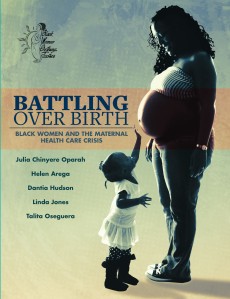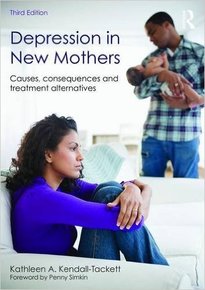Recent research in mental health on perinatal depression challenges our assumptions and shows that the scope of the problem is much broader than we previously believed.

Depression and posttraumatic stress disorder (PTSD) in pregnancy increase the risk of preterm birth—the number one cause of infant mortality worldwide. Current studies also show that birth interventions, such as epidurals, are related to both breastfeeding difficulties and depression.
Depression is a direct threat to breastfeeding. Depressed mothers are significantly less likely to initiate or continue breastfeeding. Fortunately, when breastfeeding is going well, it actually lowers mothers’ risk of depression. This is true even when mothers have a history of significant psychological trauma.
Taking action to protect mothers’ mental health is crucial in order to support breastfeeding and, in so doing, give more babies the best possible start in life.
A misleading statistic
When discussing perinatal depression, experts often say it affects “10% to 15% of new mothers.” That percentage dramatically underestimates the true incidence. Recent studies have revealed that those numbers describe mostly white middle-class mothers who have entered the mental health system. As such, it is a statistic of privilege. Unfortunately, most depressed mothers will never see a mental health provider. Yet their needs are every bit as urgent—if not more so.

What is the true incidence?
A study of 1,507 mothers from Australia found that 31% of mothers were depressed in the first 4 years.
Risk factors included:
- young maternal age
- stressful life events
- adversity
- intimate partner violence (IPV)
- low income
(Woolhouse, Gartland, Mensah, & Brown, 2015).
In the UK, a nationally representative sample of over 86,000 mothers and fathers found that in their first 12 years as a parent:
- 39% of mothers
- 21% of fathers
have been depressed. Risk of depression is highest in the first year (Davé, Petersen, Sherr, & Nazareth, 2010).
Women in high-risk groups are especially vulnerable and have very high rates of depression:
- a review of 8 Canadian studies found that up to 42% of immigrant, asylum-seeking women were depressed (Collins, Zimmerman, & Howard, 2011).
- a review of 67 studies found that violence against women during pregnancy increased the risk of depression and PTSD in the postpartum period by 3 times (Howard, Oram, Galley, Trevillion, & Feder, 2013).
- mothers exposed to natural disasters had higher rates of depression in two different studies from China and the U.S. (Qu et al., 2012; Xiong et al., 2010).
Number one cause of infant mortality
One of the more alarming recent findings was the relationship between depression and PTSD and preterm birth. The World Health Organization considers preterm birth to be the number one cause of infant mortality worldwide.

For example, a study of 16,334 women at U.S. Veteran’s Administration Hospitals found that the rate of preterm birth was 7.4% for women with no PTSD, 8% if they had previous PTSD, and 9.2% in women with current PTSD (Shaw, Asch, Frayne, Shaw, & Phibbs, 2014). Another U.S. study of 2,654 women found that the combination of PTSD and major depression increased the risk of preterm birth by 4 times (Yonkers et al., 2014). Unfortunately, those two conditions often co-occur.
Why then are we are not routinely screening for both depression and PTSD during pregnancy when it has such an impact on preterm birth and, in turn, infant mortality?
Birth interventions

Birth interventions can also increase the risk of both depression and breastfeeding difficulties. For example, a study of 5,332 mothers in the UK found that mothers who had forceps-deliveries or unplanned cesareans had more breastfeeding difficulties and depression at 3 months postpartum (Rowlands & Redshaw, 2012). Similarly, a study of 1,280 mothers from Hong Kong found that induction, opioid pain medications, and emergency cesareans were related to lower rates of both “any” and “exclusive” breastfeeding (Bai, Wu, & Tarrant, 2013).
Epidurals have been particularly controversial. Current evidence suggests that women are less likely to exclusively breastfeed if they had epidurals. A prospective study of 1,280 mothers from Australia found that women who had epidurals were more likely to be partially breastfeeding or have breastfeeding difficulties in the first week postpartum, and were twice as likely to stop breastfeeding before 24 weeks (Torvaldsen, Roberts, Simpson, Thompson, & Ellwood, 2006).
In our study of 6,410 new mothers in the first year postpartum, we found that women who had unassisted vaginal deliveries had significantly higher rates of exclusive breastfeeding than women who had any other type of birth. Women who had epidurals had significantly lower rates of exclusive breastfeeding, and higher depressive symptoms, even after controlling for possible confounding variables, including all other birth interventions, history of both depression and sexual assault, and parity (Kendall-Tackett, Cong, & Hale, 2015).
Depression threatens breastfeeding, but breastfeeding protects maternal mood
Not surprisingly, depression, anxiety, and PTSD directly threaten breastfeeding (Mathews, Leerkes, Lovelady, & Labban, 2014). For example, anxiety at 3 months postpartum reduced odds of exclusive breastfeeding by 11% at 6 months (Adedinsewo et al., 2014). A study of 2,400 births in the U.S. found that a complex pregnancy was associated with 30% lower odds of exclusive breastfeeding. However, supportive hospital practices increased odds of any or exclusive breastfeeding by 2 to 4 times (Kozhimannil, Jou, Attansio, Joarnt, & McGovern, 2014).
 Fortunately, exclusive breastfeeding lowers the risk of depression. Breastfeeding lessens mothers’ levels of inflammation (which is part of the stress response). The molecules that cause inflammation can lead to depression. When inflammation levels are high, people are more likely to get depressed. When inflammation levels are lower, the risk of depression goes down. The great thing is that breastfeeding is specifically anti-inflammatory.
Fortunately, exclusive breastfeeding lowers the risk of depression. Breastfeeding lessens mothers’ levels of inflammation (which is part of the stress response). The molecules that cause inflammation can lead to depression. When inflammation levels are high, people are more likely to get depressed. When inflammation levels are lower, the risk of depression goes down. The great thing is that breastfeeding is specifically anti-inflammatory.
Breastfeeding improves sleep quality and quantity and downregulates the inflammatory response system (Groer & Kendall-Tackett, 2011; Kendall-Tackett, Cong, & Hale, 2011). Even when women have been sexually assaulted, exclusive breastfeeding attenuates the stress response, lessens the impact of trauma, and lowers their risk of depression (Kendall-Tackett, Cong, & Hale, 2013).
These are only a few of the recent findings that illustrate how common depression in new mothers is. This affects everyone and mothers should have help to access the support they need.
References

Adedinsewo, D. A., Fleming, A. S., Steiner, M., Meaney, M. J., Girard, A. W., & MAVAN team. (2014). Maternal anxiety and breastfeeding: Findings from the MAVAN (Maternal Adversity, Vulnerability and Neurodevelopment) Study. Journal of Human Lactation, 30(1), 102–109. doi:10.1177/0890334413504244
Bai, D. L., Wu, K. M., & Tarrant, M. (2013). Association between intrapartum interventions and breastfeeding duration. Journal of Midwifery and Women’s Health, 58(1), 25–32. doi:10.1111/j.1542-2011.2012.00254.x.
Collins, C. H., Zimmerman, C., & Howard, L. M. (2011). Refugee, asylum seeker, immigrant women and postnatal depression: Rates and risk factors. Archives of Women’s Mental Health, 14(1), 3–11.

Davé, S., Petersen, I., Sherr, L., & Nazareth, I. (2010). Incidence of maternal and paternal depression in primary care. Archives of Pediatrics & Adolescent Medicine, 164(11). doi:10.1001/archpediatrics.2010.184
Groer, M. W., & Kendall-Tackett, K. A. (2011). How breastfeeding protects women’s health throughout the lifespan: The psychoneuroimmunology of human lactation. Amarillo, TX: Hale Publishing.
Howard, L. M., Oram, S., Galley, H., Trevillion, K., & Feder, G. (2013). Domestic violence and perinatal mental disorders: A systematic review and meta-analysis. PLoS Medicine, 10(5),e1001452. doi:10.1371/journal.pmed.1001452

Kendall-Tackett, K. A., Cong, Z., & Hale, T. W. (2011). The effect of feeding method on sleep duration, maternal well-being, and postpartum depression. Clinical Lactation, 2(2), 22–26. doi:10.1891/215805311807011593
Kendall-Tackett, K. A., Cong, Z., & Hale, T. W. (2013). Depression, sleep quality, and maternal well-being in postpartum women with a history of sexual assault: A comparison of breastfeeding, mixed-feeding, and formula-feeding mothers Breastfeeding Medicine, 8(1), 16–22. doi:10.1089/bfm.2012.0024
Kendall-Tackett, K. A., Cong, Z., & Hale, T. W. (2015). Birth interventions related to lower rates of exclusive breastfeeding and increased risk of postpartum depression in a large sample. Clinical Lactation, 6(3), 87–97. doi:10.1891/2158-0782.6.3.87

Kozhimannil, K. B., Jou, J., Attansio, L. B., Joarnt, L. K., & McGovern, P. (2014). Medically complex pregnancies and early breastfeeding behaviors: A retrospective analysis. PLoS One, 9(8), 310. doi:10.1371/journal.pone.0104820
Mathews, M. E., Leerkes, E. M., Lovelady, C. A., & Labban, J. D. (2014). Psychosocial predictors of primiparous breastfeeding initiation and duration. Journal of Human Lactation, 30(4), 480–487. doi:10.1177/0890334414537707
Qu, Z., Wang, X., Tian, D., Zhao, Y., Zhang, Q., He, H., . . . Guo, S. (2012). Posttraumatic stress disorder and depression among new mothers at 8 months later of the 2008 Sichuan earthquake in China. Archives of Women’s Mental Health,15(1), 49–55. doi:10.1007/s00737-011-0255-x
Rowlands, I. J., & Redshaw, M. (2012). Mode of birth and women’s psychological and physical wellbeing in the postnatal period. BMC Pregnancy and Childbirth, 12(138). doi:10.1186/1471-2393-12-138

Shaw, J. G., Asch, S. M., Frayne, S. M., Shaw, K. A., & Phibbs, C. S. (2014). Posttraumatic stress disorder and risk of spontaneous preterm birth. Obstetrics & Gynecology, 124(6), 1111–1119. doi:10.1097/AOG.0000000000000542.
Torvaldsen, S., Roberts, C. L., Simpson, J. M., Thompson, J. F., & Ellwood, D. A. (2006). Intrapartum epidural analgesia and breastfeeding: A prospective cohort study. International Breastfeeding Journal, 1(24). doi:10.1186/1746-4358-1-24.
Woolhouse, H., Gartland, D., Mensah, F., & Brown, S. J. (2015). Maternal depression from early pregnancy to 4 years postpartum in a prospective pregnancy cohort study: Implications for primary health care. British Journal of Obstetrics & Gynecology, 122(3), 312-321. doi:10.1111/1471-0528.12839.
 Xiong, X., Harville, E. W., Mattison, D. R., Elkind-Hirsch, K., Pridjian, G., & Buekens, P. (2010). Hurricane Katrina experience and the risk of post-traumatic stress disorder and depression among pregnant women. American Journal of Disaster Medicine, 5(3), 181–187. doi:10.5055/ajdm.2010.0020
Xiong, X., Harville, E. W., Mattison, D. R., Elkind-Hirsch, K., Pridjian, G., & Buekens, P. (2010). Hurricane Katrina experience and the risk of post-traumatic stress disorder and depression among pregnant women. American Journal of Disaster Medicine, 5(3), 181–187. doi:10.5055/ajdm.2010.0020
Yonkers, K. A., Smith, M. V., Forray, A., Epperson, C. N., Costello, D., Lin, H., & Belanger, K. (2014). Pregnant women with posttraumatic stress disorder and risk of preterm birth. JAMA Psychiatry, 71(8), 897-904. doi:10.1001/jamapsychiatry.2014.558
Kathleen Kendall-Tackett, PhD, IBCLC, FAPA

Dr. Kendall-Tackett is a health psychologist and International Board Certified Lactation Consultant, and the owner and Editor-in-Chief of Praeclarus Press, a small press specializing in women’s health. She is Editor-in-Chief of two peer-reviewed journals: Clinical Lactation and Psychological Trauma. She is Fellow of the American Psychological Association in Health and Trauma Psychology, Past President of the APA Division of Trauma Psychology, and a member of the Board for the Advancement of Psychology in the Public Interest. Dr. Kendall-Tackett specializes in women’s-health research including breastfeeding, depression, trauma, and health psychology, and has won many awards for her work including the 2016 Outstanding Service to the Field of Trauma Psychology from the American Psychological Association’s Division 56.
Dr. Kendall-Tackett has authored more than 400 articles or chapters, and has just completed her 35th book, The Phantom of the Opera: A Social History of the World’s Most Popular Musical. Her most recent books include: Depression in New Mothers, 3rd Edition (2016, Routledge UK, in press), Women’s Mental Health Across the Lifespan (2016, Routledge US, in press, with Lesia Ruglass), Psychology of Trauma 101 (2015, Springer, with Lesia Ruglass) and The Science of Mother-Infant Sleep (2014, Praeclarus, with Wendy Middlemiss). Her websites are:






















February 24, 2017 at 10:53 pm
In yesterday’s Guardian, I read: “We need a much more holistic approach to maternity care, that values women’s mental health as much as their physical health. When a woman is in labour, we respond to her bodily needs with speed, empathy and comprehensive care. It’s time we did the same for the exigencies of the mind.”
LikeLike
March 4, 2017 at 12:42 pm
Kathleen, you have continued to expand our understanding of the perinatal experience. The human condition is so multifactorial, and we must seek knowledge broadly in order to deeply understand and address the suffering of women and their families. Thank you from a long-time follower of your wisdom.
LikeLike